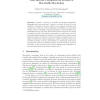Free Online Productivity Tools
i2Speak
i2Symbol
i2OCR
iTex2Img
iWeb2Print
iWeb2Shot
i2Type
iPdf2Split
iPdf2Merge
i2Bopomofo
i2Arabic
i2Style
i2Image
i2PDF
iLatex2Rtf
Sci2ools
FOSSACS
2016
Springer
2016
Springer
Join Inverse Categories as Models of Reversible Recursion
Recently, a number of reversible functional programming languages have been proposed. Common to several of these is the assumption of totality, a property that is not necessarily desirable, and certainly not required in order to guarantee reversibility. In a categorical setting, however, faithfully capturing partiality requires handling it as additional structure. Recently, Giles studied inverse categories as a model of partial reversible (functional) programming. In this paper, we show how additionally assuming the existence of countable joins on such inverse categories leads to a number of properties that are desirable when modelling reversible functional programming, notably morphism schemes for reversible recursion, a †-trace, and algebraic ω-compactness. This gives a categorical account of reversible recursion, and, for the latter, provides an answer to the problem posed by Giles regarding the formulation of recursive data types at the inverse category level.
| Added | 03 Apr 2016 |
| Updated | 03 Apr 2016 |
| Type | Journal |
| Year | 2016 |
| Where | FOSSACS |
| Authors | Holger Bock Axelsen, Robin Kaarsgaard |
Comments (0)

